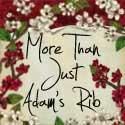"There are 1.97 million children in the United States today who are growing up in single-mother homes."
Absent fathers. It's a problem that doesn't just affect individuals or even families. It's a problem that affects an entire nation and, quite literally, an entire world.
In Douglas' Wilson's Father Hunger: Why God Calls Men to Love and Lead Their Families, he concludes "delinquent fatherhood" in America alone results in a $60 billion per year economic loss.
Wilson covers a lot in two hundred pages, from a social exploration of what he believes has led to this culture of absentee fathers to a Biblical look at what fatherhood should be. At its core, Wilson's argument is that men must first establish a positive, meaningful relationship with God the Father if they ever hope to be the fathers God intended them to be to their own children.
In one chapter, he explores how fatherlessness derives from an atheism that has been progressively growing in our culture until our postmodern era where our Nietzschean denial of God as Father is simply now playing out in our denial of human men their roles as masculine fathers as well.
He says, "The Father is the forgotten member of the Trinity. Jesus we know...The Spirit dwells with us...But among conservative believers, what movement emphasizes the Father? ....And because we don't know what the Father is for, we don't know what fathers are for" (189-91). This is likely Wilson's most interesting and compelling argument.
A second most interesting concept is Wilson's statement that men have accepted "the idol of singleness" (p. 118). He argues our society's encouraging men to "postpone" the age of marriage until the now-average of twenty-eight only serves to delay a young boy's taking up the responsibilities of manhood.
At times, I felt Wilson to be almost antagonistic in his word choices as if he was trying to incite the reader with his language. And then there were several chapters in the middle part of the book, which I wish I would have just skipped since it seemed to be the author's attempt to play the "blame game"--it's the government's fault for legalizing abortions and denying men their rights as fathers. It's the feminists' fault for transforming "masculinity" into something unnecessary and undesirable in a "men-and-women-are-really-all-the-same" kind of way. It's the gay's fault for destroying the father's role in marriage. Yawn. It's like watching a historical debate on what was the real reason behind the Civil War. Less blame, more constructive "where do we go from here."
And that is where I find Wilson lacking, in concrete, constructive ideas for men as to what exactly they can do to reestablish the role of fathers. Yes, he says it begins with the reader. And yes, he has great quotes such as "In order to guard your children against the unbelief of atheism, we need to be fathers who overflow with gratitude" (p. 62).
But ultimately, Wilson seems hesitant to go from historical analysis to application. To his credit, the author does have a chapter towards the end that runs (literally sprints) through the gospel of John, listing everything said about God the Father to show earthly fathers what a Father should look like, what characteristics earthly fathers should imitate. This is powerful stuff!!! But Wilson shoves it right at the end, stating he felt it was "too radical to put in an early chapter" (p. 189).
No! Radical is the practical application that fathers need! I truly wish Wilson would have skipped the blame game chapters and focused more here on the characteristics of God the Father that men should be emulating. This chapter alone (Chapter 14) is well worth discussing--with both men and women.
Overall, this book is worth reading. With Father's Day just around the corner, it should serve as a wake-up call for men everywhere--what is at stake is not just economic or social. What's at stake is a world full of lost souls.
Thursday, May 31, 2012
Subscribe to:
Post Comments (Atom)









Very interesting. I agree with you - the Biblical stuff is too powerful (and plentiful!) to ignore (or stick at the end of a book).
ReplyDeleteMany of my favorite "work" verses about caring for the orphan substite the word "fatherless" for "orphan" like they are one in the same! And equally in need of our advocacy and a Father/father's love.